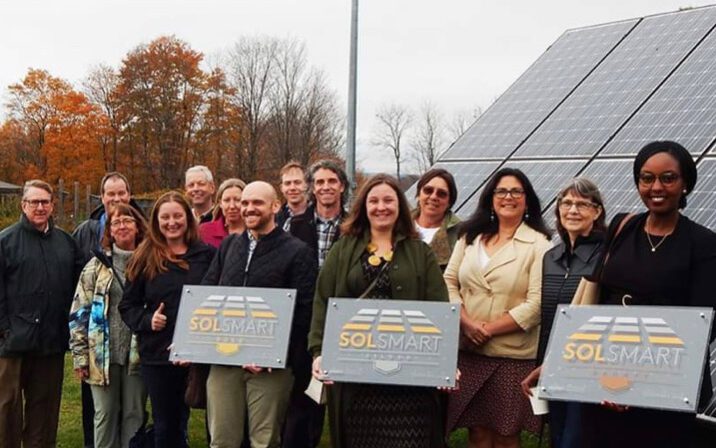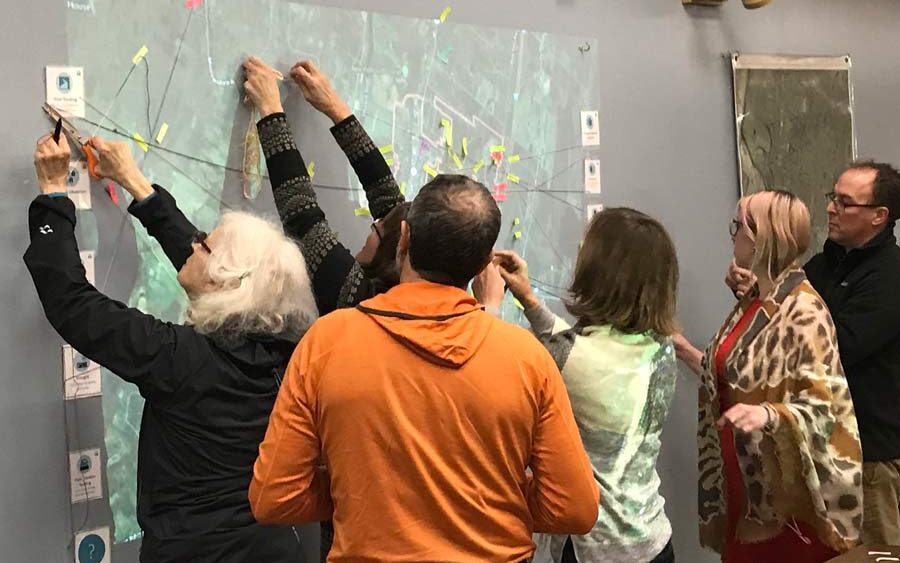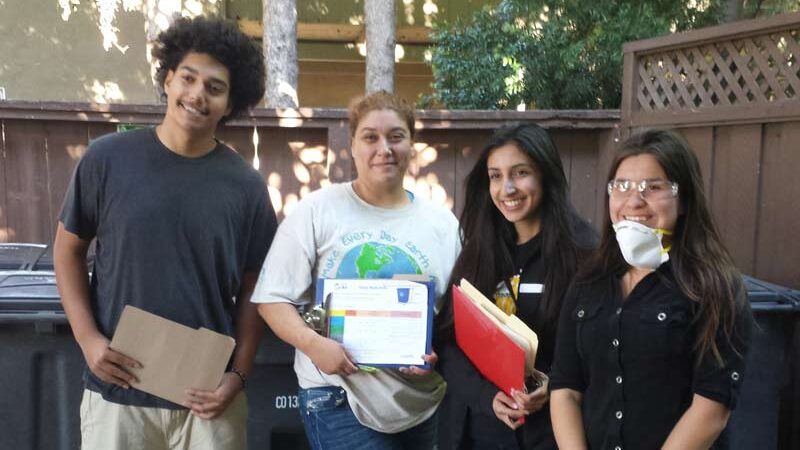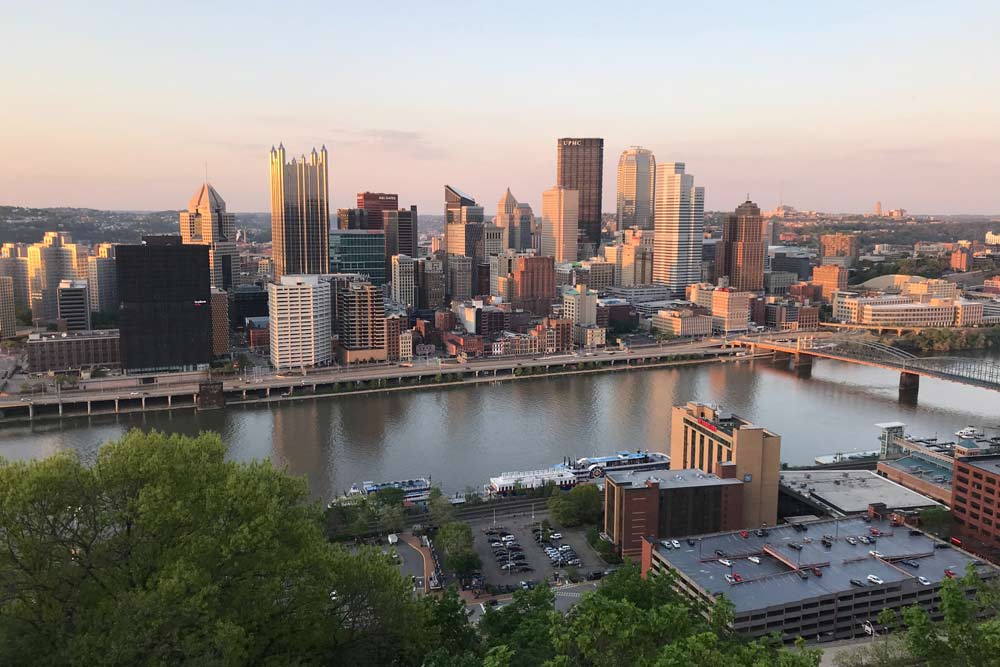On March 31, 2021, President Biden traveled to Pittsburgh to announce, in partnership with Mayor Bill Peduto, the President’s economic vision for building back better with the American Jobs Plan. This plan lays out a path that will not only deliver on jobs but also justice and climate solutions. Local governments will play an important role in building a lasting impact for this $2 trillion in investments in people and the economy.
It is fitting that these announcements were delivered in America’s Steel City, where under the leadership of Mayor Peduto, the city has undergone a green and just transformation. In 2018, Pittsburgh joined the ICLEI’s Urban Transitions Alliance, an international cohort of post-industrial communities reorienting their economies to promote green jobs and sustainability. During its time on the Alliance, Pittsburgh has forged its reimagined identity by joining the ICLEI Global Lead Cities Network on Sustainable Procurement and releasing the first local review of the United Nations sustainable development goals by a medium-sized city in the U.S.
“We have an opportunity to lead this country and this world once again and rebuild our nation through what will be the inevitable change of clean energy. Even though our region was born on coal, it doesn’t mean that is where our future needs to be,” said Mayor Bill Peduto. “We have the opportunity if we work collectively across West Virginia, Ohio, Pennsylvania, and Kentucky to begin to put together the Marshall Plan for Middle America that will make us the renewable energy capital of the world and create 400,000 new jobs in the next 10 years.”
The American Jobs Plan supports holistic climate and sustainability action at the local level, in line with the Marshall Plan for Middle America and ICLEI’s long-time commitment to serving cities, towns, and counties, large and small, rural and urban, with the tools and technical support they need to act.
Modernizing the Grid is Necessary to Add Renewable Energy
According to an ICLEI analysis of the drivers of emissions in fifteen cities, a cleaner electric grid and energy efficiency offset a large proportion of the emissions from population and economic growth. The cities that experienced the greatest increase in energy efficiency were cities in states with strong energy efficiency policies. The President’s $100 billion investment in energy infrastructure includes funding for the Economic Development Agency’s Public Works program and “Main Street ” revitalization efforts. This investment can extend the benefits outlined in ICLEI’s analysis to hundreds of more communities when states and municipalities are included thoughtfully as partners.
The American Jobs Plan outlines President Biden’s commitment to establishing an Energy Efficiency and Clean Electricity Standard. This standard will promote energy-efficient design and planning and accelerate the installation of solar and wind energy systems. Modernizing the grid to improve the efficiency of current infrastructure and develop pollution-free energy will empower local governments to work on their local efficiency improvements, freeing them up from sometimes drawn-out negotiations over power supplies.
How to jumpstart action with ICLEI: Local governments using ICLEI’s Clearpath tool, the leading software for completing greenhouse gas inventories and forecasts, can use data to discover high-impact actions and policies to increase efficiency and reduce emissions in their community. ICLEI’s technical staff will be ready to work with city and county staff to navigate the planning and implementation of grid modernization and renewable energy installation.

Retrofitting and Electrifying Buildings
To increase energy efficiency while providing affordable, resilient, homes, the plan includes $27 billion for a Clean Energy and Sustainability Accelerator, intended to mobilize private investment for residential, commercial, and municipal buildings retrofits. Moving to the electrification of buildings is among the most important and actionable local government policies for reducing emissions.
How to jumpstart action with ICLEI: Through our ICLEI150 initiative, ICLEI will provide technical assistance to cities and counties in implementing policies and programs that reduce GHG emissions in the building sector through energy codes, retrofits, and on-site renewable energy. ICLEI will provide a series of technical workshops and an expert-led community of practice to support local governments to leverage this initiative.
Electrifying Transportation
The Plan establishes grant and incentive programs for state and local governments and the private sector to build a national network of 500,000 EV chargers by 2030. $174 billion of the total $621 billion transportation package will go to incentivizing the build-out of a national charging network and would replace 50,000 diesel transit vehicles and electrify at least 20 percent of our yellow school bus fleet through a new Clean Buses for Kids Program at the EPA. Other pieces of the Plan modernize and fix 20,000 miles of roadways and repair 10,000 of the most deteriorated smaller bridges, all necessary to pave the way for an EV-ready road system. Communities can expect support for their Vision Zero efforts that create safe streets for pedestrians and cyclists, as well as support to increase transit rider demand.
How to jumpstart action with ICLEI: From our work on the Contribution Analysis, which hones the drivers of emissions change in cities, we know that transportation emissions are more challenging than electricity emissions and more work is needed to cut emissions. ICLEI will continue this research to account for the 2020 “COVID-19 effect” on transportation emissions, as we help Google expand its Environmental Insights Explorer data on local transportation emissions to more cities and counties. As part of our package for our new ICLEI150 initiative will host a series of technical workshops on high-impact actions, including EV-readiness and transportation policy.
Innovative Materials and R&D
The Plan’s infrastructure projects will use more sustainable and innovative materials, including cleaner steel and cement, and component parts Made in America and shipped on U.S. vessels with American crews under U.S. laws. These materials and reimagined supply chains are underpinned by a $180 billion investment in research and development of new technologies, including $70 billion additional R&D funding and upgrades to research institutions. Historically Black Colleges and Universities will have access to $25 billion to ensure these important institutions are leaders in generating the next generation of innovators.
How to jumpstart action with ICLEI: ICLEI’s role in the 2018 Edmonton Declaration and the delivery of our Contribution Analysis toolkit at the IPCC cities conference centered U.S. cities as knowledge centers on local climate science and policy. Last year, our Innovate4Cities Day at the Daring Cities event paired the North American-focused workshop with those from other global regions to highlight leading research out of cities and position U.S. communities as key stakeholders for exporting ideas and solutions globally. This year, we will host a Consumption-Based Accounting and Supply Chain cohort for 12 cities and counties to bring circularity and innovation to their supply chains. A Circle City Scan pilot will lay the groundwork for circular economy Strategies in another five communities.
Building Resilience
Past federal climate programs have focused on mitigation. We know an aggressive decarbonization effort is necessary to secure a livable future of warming no more than 1.5 degrees Celsius.
We also know that climate impacts are felt here and now, and communities need to be prepared. The American Jobs Plan provides more than $160 billion in resilience-themed investments, including replacing all of the nation’s lead water pipes and modernizing drinking and wastewater systems as well as funding FEMA’s Building Resilient Infrastructure and Communities program, HUD’s Community Development Block Grant program and investments in nature-based infrastructure, climate-smart technologies, and water efficiency and recycling.
How to jumpstart action with ICLEI: Communities across the country, from Denton, Texas, to Hastings-on-Hudson, New York, have worked with ICLEI to develop climate vulnerability assessments. We are uncovering the best solutions to respond to natural disasters, such as Travis County, Texas’ neighborhood fire drill program, presented to a global audience at ICLEIs’ Daring Cities forum. We have stepped up our multi-city cohort training series this year to support more than 125 communities to develop climate vulnerability assessments, integrated adaptation-mitigation-equity climate plans, nature assessment, and action plans, and others to be prepared to prioritize projects that can have the most benefit. Moreover, we have expanded our affiliate program to Tribal Nations and have already begun work to help several Tribal governments develop climate action plans.

These Benefits Must Reach all Communities
Having worked with communities of all sizes and capacities, ICLEI cannot overemphasize the importance of this plan contributing to the wellbeing of communities traditionally denied support. These communities often receive the brunt of environmental and pollution harms.
The plan targets 40 percent of the benefits of climate and clean infrastructure investments to disadvantaged communities, such as rural areas and neighborhoods bisected by large highways. We are encouraged to see the Plan’s $12 billion investment for workforce development opportunities in underserved communities and community-based small-business accelerators that will spur entrepreneurship in communities of color.
The Plan aims to mobilize the next generation of conservation and resilience workers. This $10 billion investment will put a new, diverse generation of Americans to work conserving our public lands and waters, bolstering community resilience, and advancing environmental justice through a new Civilian Climate Corps, all while placing good-paying union jobs within reach for more Americans.
How to jumpstart action with ICLEI: Through ICLEI’s experience delivering climate tools and technical training to California’s disadvantaged communities as part of the Statewide Energy Efficiency Collaborative (SEEC), we have learned that local governments can serve as partners to reskilling and workforce training programs central to a just transition economy. ICLEI Unite2Green youth ambassador program serves as a model for local delivery of a federal Climate Corps, as we institutionalize the next generation of city climate planning to include equity as a central pillar.

ICLEI Communities are on a Race to Zero and Race to Resilience
The American Jobs Plan complements President Biden’s intent to deliver a stepped-up Nationally Determined Contribution to the Paris Agreement by Earth Day. ICLEI stands ready as a network of more than 300 cities, towns, and counties across the U.S. to bring strong local-level commitments — and most importantly, implementation action — that support the enhanced NDC.
We are announcing the ICLEI150, a group of leading mayors, county commissioners, and council members, along with their local governments, working with ICLEI to implement their individual path on mid-century climate neutrality. We have calculated each community’s science-based target for 2030, telling them how much they must reduce their greenhouse gases, by which sectors, based on their GHG inventory in ICLEI’s ClearPath tool. We will go a step further, and supply these leading 150 with the highest-impact actions that can help them reach their 2030 goal and host a series of technical workshops to start them on a path to implementation. These workshops will be supported by one-on-one technical assistance and further climate modeling in ClearPath.
“We are in a truly historic moment of alignment between federal and local visions for a cleaner, greener economy and environment. We are both looking to fight the climate crisis for the safety and opportunity of our residents, said Brigid Shea, Commissioner of Travis County and ICLEI USA Board Chair. “ICLEI, with its tools and expertise, will help local governments implement bold climate action in line with Biden’s climate and jobs vision. That’s why I’m joining ICLEI150. Through ICLEI150, ICLEI will provide 150 local leaders with the blueprints they need to deepen their climate commitments, implement high-impact action, and create new green jobs as they build back better.”
An initial group of elected leaders will bring these actions forward during the U.S. Leaders Summit on April 22. And the ICLEI150 communities will spend the year moving beyond commitments to real action as part of the United Nations’ Race to Zero initiative ahead of COP26.
As we celebrate this new era of American leadership, it’s fitting that leadership from ICLEI – the first city network devoted to solving the climate crisis – is stepping up to move beyond advocacy to action.
